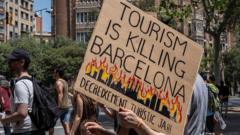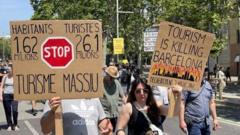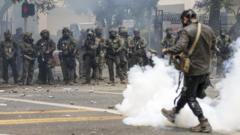In the years following his papacy, Pope Francis's interactions and relationships with global leaders and communities continue to resonate.
Pope Francis: A Diplomatic Journey Through Troubled Waters

Pope Francis: A Diplomatic Journey Through Troubled Waters
Reflecting on Pope Francis's legacy during a remarkable tour of Azerbaijan and Georgia in 2016.
As we remember Pope Francis (1936-2025), his diplomatic efforts and social grace in difficult circumstances stand out. One such instance occurred during his interfaith outreach tour in 2016 when he traveled to Azerbaijan and Georgia, countries with minimal Catholic populations and complex religious tensions.
Arriving in Tbilisi, the capital of Georgia, the Pope was met with signs proclaiming him the "Antichrist," a sentiment fueled by backlash against his progressive stances on issues like homosexuality. On the other hand, Azerbaijan's Muslim population was comparatively welcoming. The poignant moment came on the way to a Catholic cathedral in Baku, when a gust of wind blew off his zucchetta, the papal cap.
Unfazed by the incident, he continued walking as the cap lay on the ground. A military band played, and among the musicians, an Azeri trumpeter, visibly anxious, took action. He stepped forward, quickly retrieved the Pope’s cap, and placed it back on Francis's head. This act of kindness amid the political tension showed the trumpeter's bravery and the unique connection forged through such gestures.
Despite the chaos surrounding him, Pope Francis remained stoic and maintained his composure, a testament to his character. The incident not only exemplified the dynamics of a tense political environment but also illuminated the power of humility and respect in diplomacy—principles that Francis embodied throughout his papacy.
As we reflect on Pope Francis’s life and the impact he made, this moment remains a powerful reminder of the potential for kindness and grace to bridge divides, further enhancing his lasting legacy in a world often beset by discord and misunderstanding.
Arriving in Tbilisi, the capital of Georgia, the Pope was met with signs proclaiming him the "Antichrist," a sentiment fueled by backlash against his progressive stances on issues like homosexuality. On the other hand, Azerbaijan's Muslim population was comparatively welcoming. The poignant moment came on the way to a Catholic cathedral in Baku, when a gust of wind blew off his zucchetta, the papal cap.
Unfazed by the incident, he continued walking as the cap lay on the ground. A military band played, and among the musicians, an Azeri trumpeter, visibly anxious, took action. He stepped forward, quickly retrieved the Pope’s cap, and placed it back on Francis's head. This act of kindness amid the political tension showed the trumpeter's bravery and the unique connection forged through such gestures.
Despite the chaos surrounding him, Pope Francis remained stoic and maintained his composure, a testament to his character. The incident not only exemplified the dynamics of a tense political environment but also illuminated the power of humility and respect in diplomacy—principles that Francis embodied throughout his papacy.
As we reflect on Pope Francis’s life and the impact he made, this moment remains a powerful reminder of the potential for kindness and grace to bridge divides, further enhancing his lasting legacy in a world often beset by discord and misunderstanding.




















